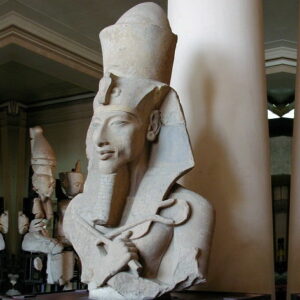Pharaoh Akhenaten reigned Egypt for 17 years, dying in 1336 BC or 1334 BC. While most kings consider attacking neighboring kingdoms to extend their territory, Akhenaten’s objectives were completely focused on Egypt. During his long reign, Akhenaten was more concerned with making ‘Atenism’ (a religion dedicated to the worship of the Sun deity) Egypt’s sole religion. His dedication to the Sun god was often reflected in Egyptian architecture during the time, which praised the god. Akhenaten is also remembered for composing a lengthy hymn to the god. Only recently, in the 19th century, were artifacts recovered that indicated the existence of ancient Egyptian Pharao. Many of the inscriptions found revealed that Akhenaten was unconcerned about his allies. He did very little to assist Egypt’s neighbors in recovering from severe political crises. Many modern historians and scholars believe that Akhenaten was one of the few scientific thinking persons of his time.
Childhood and Adolescence
Queen Tiye and Pharaoh Amenhotep III had a younger son named Akhenaten. Despite his parents’ desire to crown their eldest son Prince Thutmose, Akhenaten was the one who succeeded his father due to Thutmose’s early death.
The Career of Akhenaten
In the Egyptian capital of Thebes, Akhenaten was formally announced as ‘Amenhotep IV.’ Whether Akhenaten was crowned prince after his father’s death is still a point of contention among historians and scholars. He is also thought to have shared the throne with Amenhotep III prior to his death.
Modifications to the temples in Akhenaten’s empire were one of his first projects as monarch. He embellished the south entrance to ‘The Temple of Amun-Re,’ were one of the walls represented Akhenaten worshiping the sun god ‘Re-Harakhte.’
Akhenaten introduced the concept of ‘Atenism’ to Egyptian civilization. Several buildings were built during his reign as a gesture of respect for the sun god’Aten’s disc.
During his reign, Akhenaten made every effort to establish Aten as Egypt’s preeminent god. He also diverted monies intended for other gods and cults to the sun god’s devotion. Later on, the world came to recognize Akhenaten’s vision as ‘Judaism.’
Akhenaten was also well-known among other dynasties’ kings. Archaeologists discovered a number of inscriptions that appeared to be letters addressed to the Pharaoh by monarchs from Babylon, Assyria, and Hatti.
It’s also thought that Akhenaten’s relationship with Tushratta, Mittani’s monarch, deteriorated later. Even in a couple of Tushratta’s recently unearthed communications, the king complains of the Pharaoh’s deception. It is reported that Akhenaten delivered statues that were gold-plated but not made of gold.
Later on, Akhenaten neglected his neighboring kingdoms and had no intention of listening to their complaints. Few of Egypt’s allies requested the Pharaoh for assistance in conquering the Hittite state, but he refused to deploy his forces.
Rib Hadda was an ally who had disappointed Akhenaten tremendously. More than 60 letters addressed to Akhenaten by Rib-Hadda have been discovered, in which the latter asked Akhenaten’s assistance in resolving his kingdom’s political dilemma.
Akhenaten’s Major Projects
It was repeatedly demonstrated that Akhenaten was a huge fan of the sun god ‘Aten.’ He even authored the ‘Great Hymn to The Aten,’ the world’s longest poem in honor of the god.
Personal History and Legacy
During the early years of Akhenaten’s reign, he married Nefertiti. According to historians, the couple had six daughters. According to certain historians, the Pharaoh had another wife named Kiya.
Akhenaten also had a son with one of his biological sisters, which was just uncovered. Tutankhamen, who was also a pharaoh, was the child’s name.
Only a few archaeologists believe Kiya is the mother of Pharaoh Tutankhamen and Akhenaten’s successor Smenkhkare. Few believe that the emperor had used a couple of his daughters for sexual purposes, mostly in order to have a male child to succeed him.
There were a few other women who had the title of Queen in addition to Nefertiti. Meritaten, Akhenaten’s daughter, was dubbed the ‘Great Royal Wife.’ Akhenaten’s mother Tiye was also described as one of the Pharaoh’s ‘beloved’ in one of the recently discovered inscriptions.
Another idea about Akhenaten’s life is that he was born with a genetic defect. The Pharaoh was also said to have suffered from ‘Froelich’s Syndrome’ and ‘Marfan’s Syndrome.’ However, DNA testing performed recently on his son Tutankhamun’s body came back negative for ‘Marfan’s Syndrome,’ ruling out the chance that Akhenaten had the disease.
Although the exact date and cause of Akhenaten’s death remain uncertain, experts have discovered a tomb known as ‘KV55’ in Egypt’s lowlands. The body of Pharaoh Tutankhamun’s father was discovered in the tomb, which is thought to be Akhenaten himself.
Akhenaten’s life has piqued the interest of historians and biographers alike. Agatha Christie, a well-known English writer, wrote a play called ‘Akhnaton,’ in which she discussed the emperor. His remarkable life has inspired more than a dozen books, pieces of music, and even a few films.
‘The Eye of Ra,’ by Michael Asher, and ‘The Sleeper in the Sands,’ by Tom Holland, were two of the most popular books based on the emperor’s life.
Estimated Net worth
He has a net worth of $2 million dollars.


